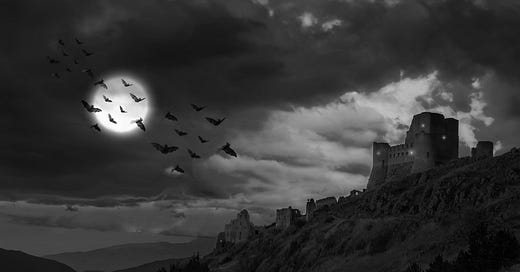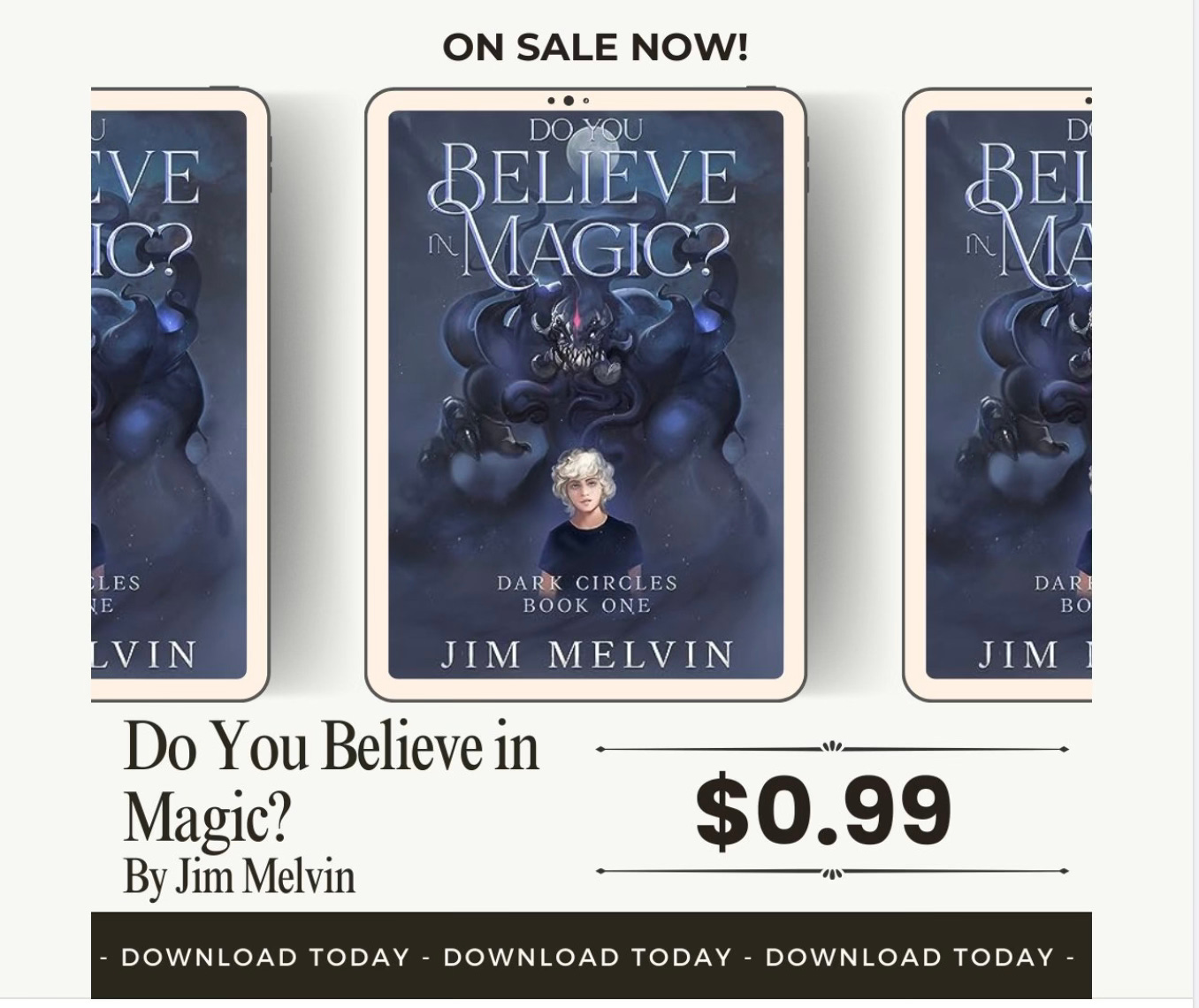Journey with me through a magical world (Chapter 25 | Book 2)
The 26th excerpt (including prologue) from "Do You Believe in Monsters?"
Every Friday, I’ll send you the opening paragraphs from a chapter of Do You Believe in Monsters?. Then I’ll break down the excerpt with comments about context, themes, and conflict. Finally, I’ll include writing tips.
DARK CIRCLES (teen fantasy adventure series)
Book 1: Do You Believe in Magic? (debuted May 25)
Book 2: Do You Believe in Monsters? (debuted Oct. 30)
Book 3: Do You Believe in Miracles? (debuted April 21, 2024)
Though my series is appropriate for ages 13 and older, I’m finding that readers younger than 13 — and many who are a lot older than 13 — are enjoying it.
Here is a brief synopsis of book 2: When Charlie Magus enters a fantastical world hidden deep in the forest, his life is turned upside down. The timid 13-year-old transforms into a powerful wizard wielding formidable powers.
Below are the opening paragraphs of Chapter 25 of book 2. My author’s breakdown follows this short segment.
Context: The final attack on Shima-Shi is about to begin.
CHAPTER 25 | THE CONFLAGRATION
Garrick surveyed the battlefield.
From the wall-walk he saw death and destruction everywhere he looked, though the enemy had suffered the worst of it. A part of him could not accept he was the leader of such proud and powerful warriors, but the Yodhin didn’t seem to question him, so Garrick figured he might as well do his best to prove them right.
“Assessment,” he said to Nobuo.
“Five thousand warriors are lost. Five hundred citizens. All the monks still live.” The tone in his voice made it obvious Meitei’s survival offended him.
“And the enemy?”
“Tens of thousands are dead,” Nobuo said. “But though we have slain many, the Niddukk’s army remains strong.”
“Has this altered the course of the war?” Garrick said.
“That depends on how powerful the Niddukk truly is.”
“Agreed,” Garrick said. He turned to the others who stood nearby.
“Kate? What are your thoughts?”
“We are back where we began,” she answered. “The Niddukk’s army is still larger and more powerful than ours. The question once again is, can they cross the lake? Thus far, the Niddukk’s tactics have failed. Except in one way.”
“How is that?” Garrick said.
“We huddle behind the wall. If the Niddukk resorted to more conventional methods to bring his army to our shore, he might be more successful this time. At the least, it would draw us out again. And every time he draws us out, our risk increases.”
“And if they don’t draw us out?” Garrick said.
“Then the final battle of the war begins,” Kate said. “Win or lose.”
Garrick once again turned to the others.
“Azura, what have you to add?”
“As Nobuo suggested, so much depends on what the Niddukk has planned for us. Has he been toying with us? Does he enjoy giving his enemies false hopes before squashing them?”
Mayor James stepped forward. “Though the Niddukk’s army remains great, it has been considerably weakened. Regardless of anything else, he still must assail our walls, which are protected by more than 50,000 Yodhin warriors. Surmounting the bulwark that encompasses Shima-Shi will be next to impossible unless the Niddukk has creatures whose might is beyond our ability to conceive.”
“The worms that destroyed Uxo-Ta would have been a threat,” Masao said. “But we have already determined they are incapable of crossing the lake.”
“Who else? What else?” Garrick said.
“The bulwark dwarfs even the giants,” Sahoota said. “The wall that surrounds Shima-Shi is many times greater than the bulwark that protected Uxo-Ta.”
“Then what?” Garrick said. “Think!”
“As Azura suggested, this is a game to the Niddukk,” Charlie said. “A game he’s confident he’ll win. Has he been toying with us? I think there’s some truth to this.” Charlie sighed. “His monsters. His armies. They are only distractions. Entertainment. We could level his army and yet the Niddukk still believes he can stroll into the arena and vanquish us.”
“If this is so, Lord Charlie, we should surrender now and beg for mercy,” Mal-Tal said.
“No,” Charlie said.
“Why not?” Zola said.
“Because I’ve been given a gift. I’ve spent my entire time in Pacchann trying to tell all of you that I’m nothing but a skinny boy. And the entire time, I’ve been right. Except for one thing: The being who gifted me his powers does not fear the Niddukk. I’m not saying he’s more powerful than the Niddukk, but he might be in the same league. And if he is, I might also be. If so, we have hope.”
“If it’s true, then we fight until we have no fight left in us,” James said. “And if we’re still standing, we’ll have one final fight. Against the Niddukk himself. Do I have this right, Lord Charlie?”
“Maybe,” Charlie said.
“If you are the Niddukk’s match, then what?” Kate said. “Will he run and hide?”
“If he does, we will hunt him down and destroy him once and for all.”
End of excerpt.
Themes: High stakes; standing your ground; preparing for war.
Between the lines: This excerpt is a good example of the role “context” plays in narrative writing. The segment above occurs about 500 pages into my series, so if you’ve read pages 1-499, this scene will make a whole lot more sense and will be far more interesting than if you just picked up page 500 and read it cold. Writers earn their voices starting on page 1.
Before I read a long novel, I’ll often skip to page 100 and read a couple of paragraphs. Then do the same on 200 and 300. I get a kick out of reading those short segments cold and then gauging my reaction to them when I re-read them with context later on. It always amazes me how differently I react during the second reading. It’s like the difference between watching a stranger cry on a lonely park bench or actually being that stranger and knowing the lifetime of events that led you to those tears. The narrative of a book matures figuratively in much the same way as people mature literally.
Posting excerpts from novels—which I’ve been doing now for 50 straight weeks—can be a tricky business because of context. I’m putting my reputation on the line while having to leave out most of the intricate mechanisms that make my work stand out. Hopefully, there’s enough tantalization there to pique your curiosity and make you want to read the whole thing.
Writing tips: We all have our own theories on how and when to use dialogue tags. Some writers liberally sprinkle them throughout their work: said, asked, claimed, shouted, cried, murmured, whispered, moaned, whined, etc. Other writers only use the word said. Still others barely use dialogue tags at all.
I fit somewhere in the middle. About 70 percent of the time, I use said. In this week’s excerpt, I used said in all instances except one when I used answered. Though there is no right or wrong way to do this (as long as you punctuate correctly), I think that most writers lean toward using dialogue tags judiciously.
As you can see above, entire books have been written about dialogue and dialogue tags, so it would take me awhile just to scratch the surface. But here are a few thoughts:
The easiest time to use dialogue tags sparingly is when only two characters are speaking. When three or more characters are talking to each other, dialogue tags become more important. To avoid confusion, writers are almost forced to use them more frequently.
An exception to No. 1 is when the diversity of your characters makes it obvious who is speaking. For instance, one character might use a lot of profanity, another might speak in formal English, while a third might be a toddler who only says ma-ma and da-da. With those three characters, a writer could go on for several pages without needing a dialogue tag.
Correct (70% of the time): “Do you love me?” he said.
Incorrect (70% of the time): “Do you love me?” he asked.Using indirect dialogue can also cut back on tags. Example: He asked her if she loved him.
When dialogue is woven into the narrative, it takes on added depth. Here is an excerpt from A Storm of Swords by the great George R.R. Martin:
Three hundred against thirty thousand. Chett called that rank madness, and what was madder still was that Ser Mallador had been persuaded, and the two of them together were on the point of persuading the Old Bear. "If we wait too long, this chance may be lost, never to come again," Smallwood was saying to anyone who would listen. Against that, Ser Ottyn Wythers said, "We are the shield that guards the realms of men. You do not throw away your shield for no good purpose," but to that Thoren Smallwood said, "In a swordfight, a man's surest defense is the swift stroke that slays his foe, not cringing behind a shield."
“And that’s the end of this writing tip,” Jim Melvin shouted. “Please let me know your thoughts on how and when to use dialogue tags.”
Past episodes of Book 2 (Do You Believe in Monsters?)
Prologue | Chapter 1 | Chapter 2 | Chapter 3 | Chapter 4 | Chapter 5 | Chapter 6 | Chapter 7 | Chapter 8 | Chapter 9 | Chapter 10 | Chapter 11 | Chapter 12 | Chapter 13 | Chapter 14 | Chapter 15 | Chapter 16 | Chapter 17 | Chapter 18 | Chapter 19 | Chapter 20 | Chapter 21 | Chapter 22 | Chapter 23 | Chapter 24
Past episodes of Book 1 (Do You Believe in Magic?)
Prologue | Chapter 1 | Chapter 2 | Chapter 3 | Chapter 4 | Chapter 5 | Chapter 6 | Chapter 7 | Chapter 8 | Chapter 9 | Chapter 10 | Chapter 11 | Chapter 12 | Chapter 13 | Chapter 14 | Chapter 15 | Chapter 16 | Chapter 17 | Epilogue
Promotional notes
Dark Circles is a teen fantasy adventure series appropriate for ages 13 and older, though readers as young as 10 and as old as 80 have told me they loved it — sort of like the Harry Potter series. This heartfelt coming-of-age series has won multiple first-place awards in four international contests. All three books of the series are now available in four formats: ebook, paperback, hardcover, and audiobook.
DARK CIRCLES
Book 1: Do You Believe in Magic? (debuted May 25, 2023)
Book 2: Do You Believe in Monsters? (debuted Oct. 30, 2023)
Book 3: Do You Believe in Miracles? (debuted April 21, 2024)






Looks cool, nice and macabre